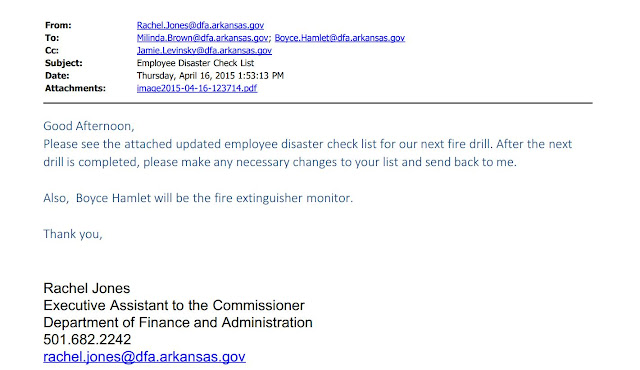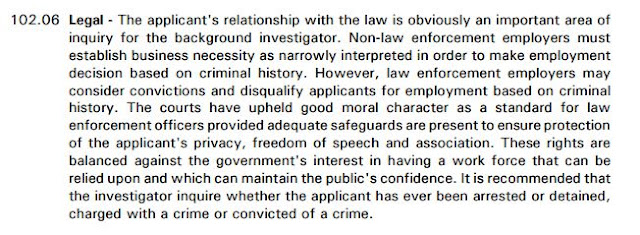Very few acts of misconduct are as damaging to a law enforcement officer's career than that of lying. Courts have noted time and again that integrity is a fundamental job requirement. For example, the courts stated in Kolender v. San Diego County Civil Service Commission (2005) 132 Cal. App. 4th 716:
A deputy sheriff's job is a position of trust and the public has the right to the highest standard of behavior from those they invest with the power and authority of a law enforcement officer. Honesty, credibility, and temperament are crucial to the performance of an officer's duties. Dishonesty is incompatible with the public trust.
Common sense tells you that to effectively prosecute crimes, officer credibility is critical. Often, the officer's word is taken over that of a civilian, with both judges and juries frequently awarding a "tie" in a "he said, she said" or "swearing contest" to the officer based on "honesty" and "integrity" that is required to hold the job. Thus when an officer's integrity is compromised, management understandably concluded that the law enforcement mission may be harmed by the officer's continued service.
Truthfulness is not only an issue of police witness credibility in a court of law; it strikes to the core of the ability to perform essential functions effectively. Police officers complete factual reports based on their investigations and observations. These reports are relied upon by others to further investigations and are often used as critical evidence in a variety of proceedings. Officers take enforcement action; secure evidence; maintain confidential information; have access to privileged information; handle drugs; handle money, and guns' process crime scenes; maintain reports of crimes and accidents; and, importantly, they are authorized by law to dispossess others of their constitutional rights and use deadly force when appropriate. Simply put, a law enforcement officials word, and the complete veracity of that word, is fundamentally necessary to doing the job.
Integrity is so important to the law enforcement professional that a single lie can cost an officer his or her career. As noted in Kolender, supra at 722:
While at common law, every dog was entitled to one bite, we know of no rule of law holding every deputy sheriff is entitled to [tell one lie] before he or she can be discharged...
Judicial pronouncements unequivocally provide that peace officers are held to the highest standards of behavior, with honesty and credibility being crucial to proper performance of their duties. In Ackerman v. State Personnel Board (1983) Cal, App. 3d 395, the court found conduct could still support termination for a peace officer, because "a police officer must be held to a higher standard than other employees. A police officer is expected to tell the truth".
Under Brady v. Maryland (1963) 373 U.S. 83, to ensure a fair criminal trial, prosecutors are obligated to notify criminal defendants about exculpatory evidence, which includes evidence that could be used to challenge the credibility of a material prosecution witness. This is especially significant to the ability to effectively prosecute cases because an officer is often the only witness to the charged criminal act or the incriminating statements or conduct, and criminal defendants often dispute the officer's account of evidence.
Thus, dishonesty poses a dilemma for the employing law enforcement agency. If the Prosecuting Attorney's Office takes the position that it will not prosecute cases where the only witness in a Brady officer, then the officer cannot perform one of his or her fundamental job duties. In addition this can impact other officers as well p what happens if an officer proven to be dishonest in one instance is the only witness as to the actions of another officer in the field in, for example, an officer involved shooting. The harm would not fall on the Brady officer, but on his or her colleague because the only corroborating witness is someone whose credibility has been severely undermined and damaged.
"Dishonesty" has been defined as conduct that "connotes a disposition to deceive" and " an absence of integrity; a disposition to cheat, deceive or defraud." Gee v. State Personnel Board (1070) 5 Cal. App. 3d 713, 718-719. Dishonesty "is not an isolated act; it is more a continuing trait of character." Gee, supra; Paulino v. Civil Service Commission of San Diego (1985) 175 Cal. App. 3d 962.
Honesty is the best policy, with untruthfulness to be an avoidable offense. Tell the truth even when it makes you look bad.
Over the last few weeks we have made repeated requests for Hamlet to admit or deny that he withheld his employment and termination from the Arkansas State Police from his former employers and the Mississippi Law Enforcement Certification agency. Hamlet refused to respond.
The facts in this matter are clear. Hamlet has no business being a certified law enforcement officer much less heading a law enforcement agency. Hamlet's law enforcement credentials need to be revoked and he needs to be removed from his position as director of ABC Enforcement to protect the integrity and reputation of the Department of Finance and Administration, the Alcoholic Beverage Control and the State of Arkansas.



















































